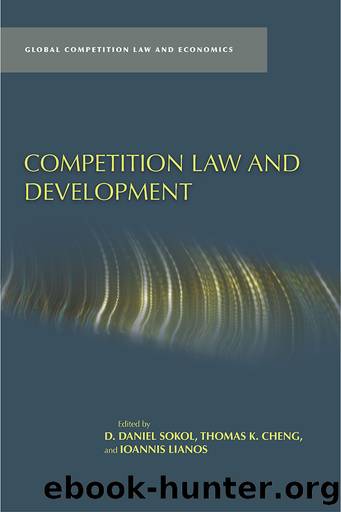Competition Law and Development by Unknown

Author:Unknown
Language: eng
Format: epub
Publisher: Stanford University Press
Published: 2013-08-15T00:00:00+00:00
NOTES:
1 Criminal provision not yet in force.
2 Concurrent in En gland, Wales, and Northern Ireland; prosecution only by public prosecutor in Scotland.
The data in this study call into question the prosecutorial competence hypothesis and lend some support to the bureaucratic incentives hypothesis. With regard to prosecutorial competence, countries in the study in which the competition agency lacks the reference power, and therefore cannot stop the public prosecutor from prosecuting cartels, actually appear to have the strongest criminal cartel enforcement and the greatest chance at imposing imprisonment. Consistent with the bureaucratic incentives hypothesis, however, countries in which the competition agency has the referral power and can control the prosecutor have the weakest criminal enforcement.
Brazil is a good example. Brazil is perhaps the most active criminal enforcement regime in the study; criminal prosecutions are relatively frequent and jail terms for cartel offenses have been imposed.44 Brazilâs competition law provides for civil fines for organizations and individuals, but does not include a criminal provision. Instead, criminal cartel behavior is prosecuted under the Economic Crimes Law, which prosecutors have authority to invoke without regard to what the competition agency does (or does not do).45 Although Brazilian competition agencies now routinely ask prosecutors to open investigations into cartel matters that the competition agency is looking at and get help from prosecutors in investigating these matters, prosecutors do frequently bring cases on their own, without working with the competition agency.46
Germany is in a similar institutional position. The competition agency can impose civil fines against organizations and individuals, but public prosecutors operate under a separate bid-rigging statute that only they have the authority to invoke.47 As in Brazil, German prosecutors have obtained a relatively large number of convictions (although actual jail time remains rare).48
Chile presents a similar institutional structure, but a more modest outcome. Chile decriminalized its antitrust law in 2003, but in 2011 the public prosecutor brought criminal charges against executives of three pharmacy chains for fixing prices, using provisions of the criminal code dealing with fraud.49 This is a rare prosecution, but it shows a willingness of the public prosecutor to take on price-fixing behavior.
By contrast, in Japan, where the competition agency controls the bringing of criminal cases under Japanâs competition law, criminal prosecutions have been rare and imprisonment has yet to be imposed.50 The results are similar in Korea, where the antitrust enforcement authority has exclusive referral authorityâcriminal prosecutions have been relatively rare and imprisonment has not been imposed in cases where convictions have been obtained.51
These results thus call into question the fear that public prosecutors will not be interested in bringing cartel cases or will not be successful when they do. If anything, the institutional competence appears to run in favor of the public prosecutor rather than against it. In some ways this is not surprising. After all, public prosecutors are more familiar than the competition agency with the special procedural requirements of a criminal prosecution and have more familiarity with the investigation of criminal law matters. A competition agency taking on such tasks might very well lack sufficient experience to do them well.
Download
This site does not store any files on its server. We only index and link to content provided by other sites. Please contact the content providers to delete copyright contents if any and email us, we'll remove relevant links or contents immediately.
Goodbye, Things by Fumio Sasaki(7733)
The Road Less Traveled by M. Scott Peck(6643)
Daring Greatly by Brene Brown(5646)
Grit by Angela Duckworth(4742)
Big Magic: Creative Living Beyond Fear by Elizabeth Gilbert(4730)
Discipline Equals Freedom by Jocko Willink(4641)
The Wisdom of Sundays by Oprah Winfrey(4630)
You Are a Badass at Making Money by Jen Sincero(4257)
Influence: The Psychology of Persuasion by Robert B. Cialdini(4185)
Ego Is the Enemy by Ryan Holiday(3999)
The Laws of Human Nature by Robert Greene(3955)
The Miracle Morning by Hal Elrod(3916)
Rising Strong by Brene Brown(3785)
Reflections Of A Man by Mr. Amari Soul(3705)
A Simplified Life by Emily Ley(3576)
The Power of Positive Thinking by Norman Vincent Peale(3459)
Seriously... I'm Kidding by Ellen DeGeneres(3103)
Delivering Happiness by Tony Hsieh(2926)
The Choice by Edith Eva Eger(2900)
